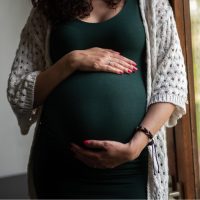Tokophobia: an extreme fear of pregnancy and childbirth.
Franziska Wadephul, University of Hull; Catriona Jones, University of Hull, and Julie Jomeen, University of Hull
Childbirth can clearly be a scary prospect. For women who have not given birth before, it is the great unknown. Research into women’s concerns and fears suggests that women may be anxious about the risk of injuries or complications, pain, their ability to give birth, losing control, and interactions with health professionals.
Even women who have given birth before may have similar worries – as every birth is different. But they may also have specific concerns if they had a difficult previous birth experience. This suggests that not only is it normal for women to be worried or anxious about birth, but that it would be unusual if they were not.
But of course, anxiety about birth occurs along a continuum. This ranges from women who are a little bit worried, to those who have developed a true phobia of birth. For some women, this phobia – known as tokophobia – is so severe that they never become pregnant or, if they do, they may decide to terminate the pregnancy.
Severe fear
There are interventions which can be effective for severe tokophobia. But women will only benefit from them if they feel able to disclose their severe fear (and are taken seriously) – or if healthcare professionals are able to identify them. This does not just require training and increased awareness of tokophobia, but also appropriate screening tools and care pathways that ensure women receive timely and appropriate treatment.

Overcoming tokophobia is possible with the right care.
Shutterstock
At the University of Hull we have been working with local services for the last decade to ensure that women with perinatal mental health problems receive the care and support they need. Together with mental health practitioners, midwives and health visitors we are now developing a pathway for women with tokophobia.
Impact of social media
There is some research evidence that other people’s negative birth stories may increase the fear of birth for some women. But on the other hand, many women find it helpful to talk about their experiences. And research shows that peer support and sharing stories about challenging experiences can help to reduce feelings of isolation and provide validation.
Clearly, there is a tension here between the needs of these two groups of women – those who find it therapeutic to talk about their birth experiences and those whose fears may be increased by reading these stories. Contrary to some media reports, this is not about telling women to “shut up about childbirth”, but it is important to be mindful of the impact sharing may have on others.
Then there is also the issue that women who share traumatic experiences of birth on social media may have an unmet need for professional support – which would most likely be a more effective way of helping them cope with these experiences.
The right care
So while it’s clear that some anxiety and worry around birth is normal and to be expected, it’s also important that women with a more severe fear of birth feel able to talk about their concerns – rather than being told that it’s normal to be worried and that everything will be OK. This is important, because women who are experiencing a severe, overwhelming fear of birth will not be reassured by being told that everybody gets a little anxious. What they need is supportive, appropriate and timely care.
That’s not to suggest every pregnant woman who ever expresses any concerns about birth needs to be treated for fear of birth, though pregnant women with raised anxiety levels may benefit from interventions even if they do not suffer from tokophobia. Anxiety in pregnancy has been linked to a number of negative effects on mothers and babies. And early intervention can be crucial in preventing this leading to more serious problems.
But what’s most important, is that all women receive appropriate care and support – including women who have a severe fear of birth and those who have experienced traumatic births. Providing high quality care for all women should diminish the chances of women developing tokophobia after their first birth and help to reduce the amount of negative stories being shared.
Read more:
Tokophobia: what it’s like to have a phobia of pregnancy and childbirth
![]()
Franziska Wadephul, Research Assistant, University of Hull; Catriona Jones, Senior Research Fellow in Maternal and Reproductive Health, University of Hull, and Julie Jomeen, Professor of Midwifery and Dean in the Faculty of Health Sciences, University of Hull
This article is republished from The Conversation under a Creative Commons license. Read the original article.
We may get commissions for purchases made using links in this post. Learn more.























-

-
-
-
skbou said
- 28 Jul 2019
-

-
-
-
mom81879 said
- 15 Nov 2018
-

-
-
-
BellaB said
- 15 Oct 2018
-

-
-
-
curlytops said
- 13 Oct 2018
-

-
-
-
Ellen said
- 12 Oct 2018

-

-
-
-
mom265671 said
- 11 Oct 2018
-

-
-
-
Blossom said
- 11 Oct 2018
-

-
-
-
mom114371 said
- 11 Oct 2018
Post a comment4:46 pm
10:21 am
7:10 pm
11:10 am
4:10 am
11:59 pm
8:53 pm
8:49 pm
To post a review/comment please join us or login so we can allocate your points.